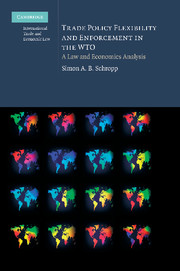Book contents
- Frontmatter
- Contents
- List of figures
- List of abbreviations
- Acknowledgements
- Foreword
- 1 Introduction: trade policy flexibility in the WTO – vice or virtue?
- PART I An introduction to incomplete contracting
- 2 Complete contracts and the contracting ideal
- 3 Incomplete contracting and the essence of flexibility
- PART II Theorizing about the WTO as an incomplete contract
- PART III Flexibility and enforcement in the WTO: towards an agenda for reform
- Bibliography
- Index
3 - Incomplete contracting and the essence of flexibility
Published online by Cambridge University Press: 05 May 2010
- Frontmatter
- Contents
- List of figures
- List of abbreviations
- Acknowledgements
- Foreword
- 1 Introduction: trade policy flexibility in the WTO – vice or virtue?
- PART I An introduction to incomplete contracting
- 2 Complete contracts and the contracting ideal
- 3 Incomplete contracting and the essence of flexibility
- PART II Theorizing about the WTO as an incomplete contract
- PART III Flexibility and enforcement in the WTO: towards an agenda for reform
- Bibliography
- Index
Summary
The Pareto-optimal complete contingent contract is a hypothetical construct that does not correspond to any contract that has ever been or will be concluded. Intuitively, writing a CCC is neither practical nor feasible: it does not appear practical, since even in a stationary world, i.e. one where environmental circumstances do not change at all, it is prohibitively costly to lay down in detail all permissible (read: joint welfare maximizing) behavior of transactors (Horn, Maggi, and Staiger 2005). Even if one abstracted from the costs of negotiating and writing down a contract, writing a CCC would still be impractical.
In real life, however, it is not only impractical but flat-out impossible to write a complete contract, since the future is only imperfectly foreseeable for contracting parties (Masten 1999; Shavell 1980; Craswell 1999). Clearly, the world is not stationary but volatile and ever-changing. A complete contingent contract would have to consider all sorts of present and future environmental or behavioral contingencies and prescribe in a detailed and unambiguous fashion the admissible welfare-maximizing behavior by all contracting parties. Every contingency, occurring even with the slightest probability at any point of time during the contract duration, would have to be considered and contractually fixed.
Thus, all contracts known today are incomplete (Dixit 2007). They contain gaps, that is, they are insufficiently contingent and (in a strictly technical sense) inaccurately written. This chapter provides a structured introduction to contractual incompleteness.
- Type
- Chapter
- Information
- Trade Policy Flexibility and Enforcement in the WTOA Law and Economics Analysis, pp. 60 - 130Publisher: Cambridge University PressPrint publication year: 2009
- 1
- Cited by



